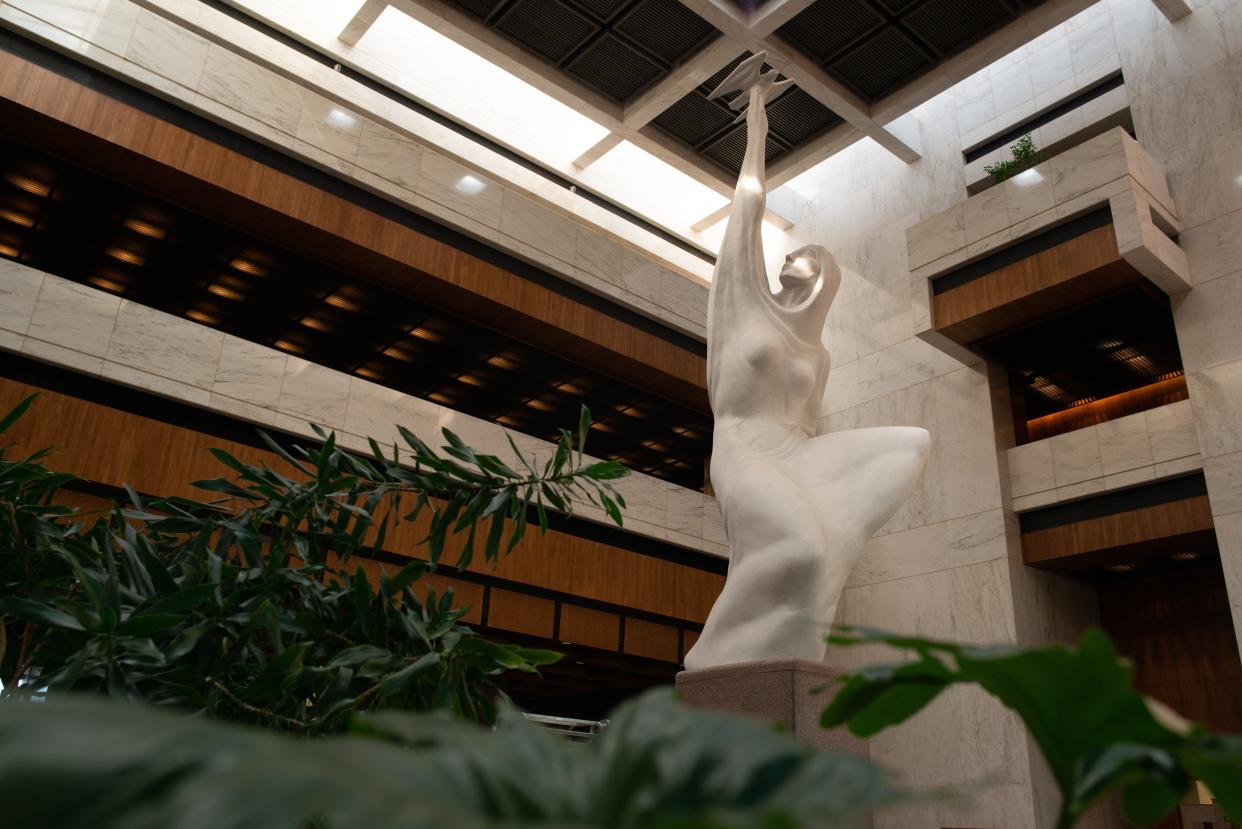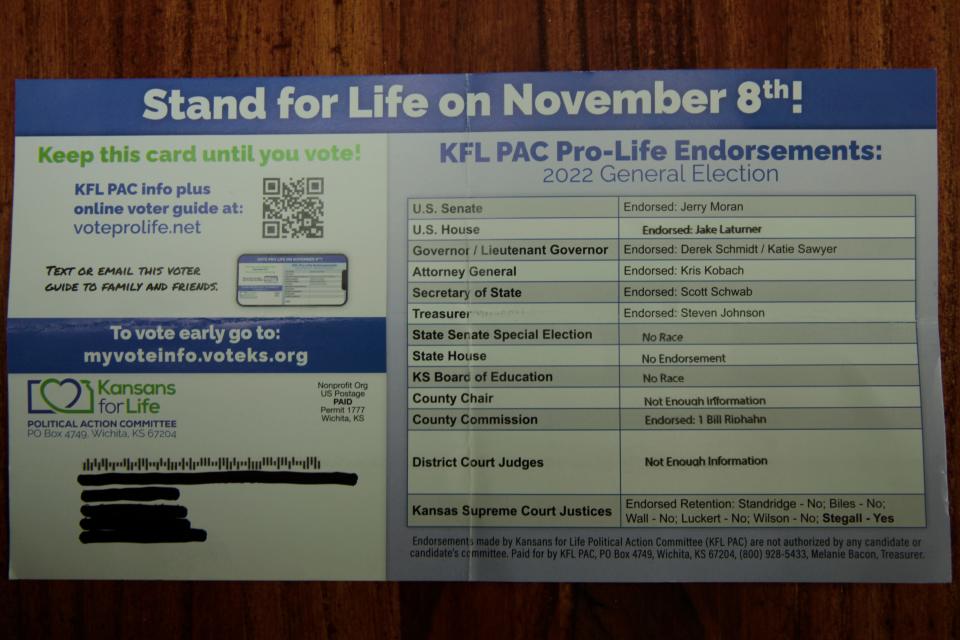Kansans voted to keep their judges. But the state's high court will once again be in spotlight.

- Oops!Something went wrong.Please try again later.
- Oops!Something went wrong.Please try again later.
When voters in November elected to keep the current composition of the state's appellate courts intact, it caused supporters to breathe a sigh of relief.
The peace, however, may well be short lived.
More:Who should control the Kansas Highway Patrol? Some lawmakers say Kris Kobach.
Lawmakers are expected to again consider changes to the state's selection process for Kansas Supreme Court justices when they return in January, a topic that will be more charged than ever as Republicans seek to lay the groundwork for an eventual reversal of a landmark case establishing state constitutional protections for abortions.
The bulk of the court earned new six-year terms with their triumph in November, though the state-mandated retirement age of 75 looms for some of the justices within the next decade.
Meanwhile, Gov. Laura Kelly's victory in November could strengthen the possibility that the court's current composition will be maintained. Kelly has appointed three of the court's seven justices and an additional three justices were picked by Gov. Kathleen Sebelius, a Democrat, or moderate Republican Gov. Bill Graves.
More:As pipeline operator searches for cause of Kansas oil spill, residents await cleanup
Still, at least two of the justices told The Capital-Journal they had no plans to retire before their next term was up. And observers say they expect political considerations and maintaining the court's current makeup will not be factors in guiding when the sitting justices decide to ride off into the sunset.
"If anybody left their term early, it was for personal reasons," Lawton Nuss, who served as chief justice of the Kansas Supreme Court before retiring in 2019, said. "I'm not aware of any situation where they said 'I want such and such governor to appoint my replacement, so I'm leaving now.' I'm just not aware of that."
Kansas voters overwhelmingly retain Supreme Court justices in November
Ahead of the November election, many expected the question of whether to retain the justices would turn into a battle royale.
In 2014 and 2016, outside groups cropped up in the months or even days before the election in an effort to oppose the retention of certain justices. Other groups, such as Kansans for Fair Courts, an arm of the liberal Kansas Values Institute, waded in to back the justices.
More:Will the next battle be an effort to oust Kansas Supreme Court justices after abortion vote?
The high court has become a touchpoint for political debate in recent years. Rulings that have required the Legislature to spend more on education to meet constitutional requirements and protect abortions rights in Kansas have frustrated Republicans and made the Kansas Supreme Court an increased target of ire.
But, in the wake of the failed Aug. 2 constitutional amendment vote on abortion, abortion opponents did not target the justices in any robust manner.

Some limited opposition did form. Kansans for Life did oppose retention of all justices except conservative Caleb Stegall and sent a mailer to voters outlining their position. The Kansas Republican Party took a similar approach in their voter guide.
The most active group was Keep Kansas Courts Impartial, headed by former Justice Carol Beier, who supported the justices on the ballot via TV ads.
"There really wasn't the big effort that I certainly was expecting," Nuss said.
More:As pipeline operator searches for cause of Kansas oil spill, residents await cleanup
Nonetheless, all five justices prevailed with over 65% of the vote; Stegall won with 73%. All of the Kansas Court of Appeals justices were also retained with around 70% support.
"I think that the Kansas population is paying close attention to many issues that come before the court," Sen. David Haley, D-Kansas City, said. "And even with organized opposition, the jurists, the incumbent jurists, all of them seem to marshal good favor."
Could Kansas Supreme Court Justices retire in the coming years?
Kelly's victory in November gives her another four-year window in which to continue to potentially shape the state's highest court, as well as lower-level district courts ― though it remains unclear whether she will be given an opportunity to do so.
Of the current members on the court, three ― Marla Luckert, Evelyn Wilson and Melissa Standridge ― were appointed by governors of the same party as the justice they replaced. Others were Democrat-appointed justices who followed colleagues picked by moderate Republicans, or replaced justices who died or, in one case, were appointed to the federal bench.
More:Joe Biden taps former Missouri prosecutor to lead U.S. attorney's office in Kansas
The power to fill vacancies on a wide variety of state boards and commissions is a widely overlooked one for governors, said Bob Beatty, a professor of political science at Washburn University. Most notably, that applies to the judiciary.
"A governor can have a massive legacy that's serving two terms, when you get into the thousands of appointments that they make," Beatty said. "But in terms of the courts, there's just no question that even if judges don't publicly say it, of course they're thinking about the political ramifications of when to retire."

But Luckert, speaking with reporters earlier this month, disagreed.
"In my view, I think it's very important that courts remain nonpolitical," she said. "And a part of that is the selection process is set up so that whoever is the governor at the time, resignation or retirement or whatever the situation, (makes the selection)."
Barring an unforeseen circumstance, Luckert said she was expecting to finish out her next term in office, set to run until 2028.
"I wish I had a crystal ball," she said. "I would hope that I am able to serve the full six years or so."
Justice K.J. Wall who, like Luckert, was retained in the Nov. 8 election, said he had no plans to retire.
"This is my dream job and I plan to be around as long as the voters of the state will have me," he told The Capital-Journal earlier this month.
Judicial selection again set to be a hot topic in Legislature
The court has long transfixed the Legislature and it will almost certainly do so again next session.
Lawmakers last session took another run at changing the selection process used to appoint justices to the Kansas Supreme Court, the so-called "merit selection" system.
This is not a new idea; Nuss recalled a legislative hearing shortly after he was appointed to the bench, where he witnessed one of his fellow justices, Fred Six, testify before lawmakers to oppose changes to the process.
More:Joe Biden taps former Missouri prosecutor to lead U.S. attorney's office in Kansas
Under the current system, a nonpartisan panel interviews applicants and recommends three qualified finalists to the governor, who makes the final pick. The Kansas Senate does not vote on the nominee, though they do weigh in on Kansas Court of Appeals selections.
Republicans frequently argue this gives too much power to attorneys, who comprises a majority of the screening panel.
Conservatives also frequently argue that the Kansas Supreme Court is often reversed on appeal by the U.S. Supreme Court as a reason to justify changing the status quo.
Legal experts caution that reversal rates are an imperfect tool of measuring the judicial capabilities or a jurist or court system.
Since 2007, eight cases previously heard by the Kansas Supreme Court went on to the federal high court, with it ultimately being reversed in seven instances. This 87.5% reversal rate is higher than the national average for all state courts at 76%. During the 2021-22 U.S. Supreme Court term, all lower courts, both federal and state, were overturned 81% of the time.
More:What will downtown Topeka's new Docking State Office Building look like? Here are the renderings
Lawmakers have considered whether to move towards a model that resembles the way U.S. Supreme Court and federal judges are picked, where the governor would select a nominee who would then need to be confirmed by the Kansas Senate.
Another option would be partisan elections for judges; an option used in eight states. Or, legislation already introduced by Rep. Brett Fairchild, R-St. John, would make it easier to impeach and remove justices for certain offenses.
"I'd like to see us move toward the middle of the road more like the federal model that we discussed," Sen. Mike Thompson, R-Shawnee, said. "And I think it would serve the state a little bit better and give people more voice in the process."
The Senate fell short of the two-thirds majority needed to advance a constitutional amendment to change the judicial selection process last session. And even some top Republicans are skeptical of trying again.
"It's not something that's being talked about," House Speaker Dan Hawkins, R-Wichita, told reporters last month. "I'm listening right now to a lot of people and have not heard that one."
The current merit selection process has ample support from many in the state's legal community, as well as a bipartisan cadre of legislators, who argue it is a way of counteracting corruption, the reason it was first introduced in the 1950s.
Still, there is little doubt that the high court will continue to remain in the limelight.
A Kansas Court of Appeals decision earlier this year paved the way for a Shawnee County judge to halt enforcement of the state's ban on telemedicine abortion last month.
And while the Supreme Court previously denied a request to review the lower court ruling on the matter, Luckert acknowledged that the issue would likely come before them at some point.
"It sounds like there's at least a chance of that," she said. "We do have cases pending on appeal from district court decisions that will be coming to our courts."
But Rep. John Carmichael, D-Wichita, said the August abortion vote, where residents rejected a proposal that would erode state-level constitutional protections for abortion rights, should serve as a cautionary tale for those wanting to change the judicial selection process.
Even if the amendment were to pass out of the Legislature, there is no guarantee it would pass muster with voters in the coming years.
"If my Republican colleagues want to compound the problems they're going to face two years from now, when the Senate and House is up for reelection," he said. "The way they could do that is to deepen the hole that they've already dug on the constitutional amendment regarding abortion."
Andrew Bahl is a senior statehouse reporter for the Topeka Capital-Journal. He can be reached at abahl@gannett.com or by phone at 443-979-6100.
This article originally appeared on Topeka Capital-Journal: Kansas lawmakers likely to again consider judicial selection changes

